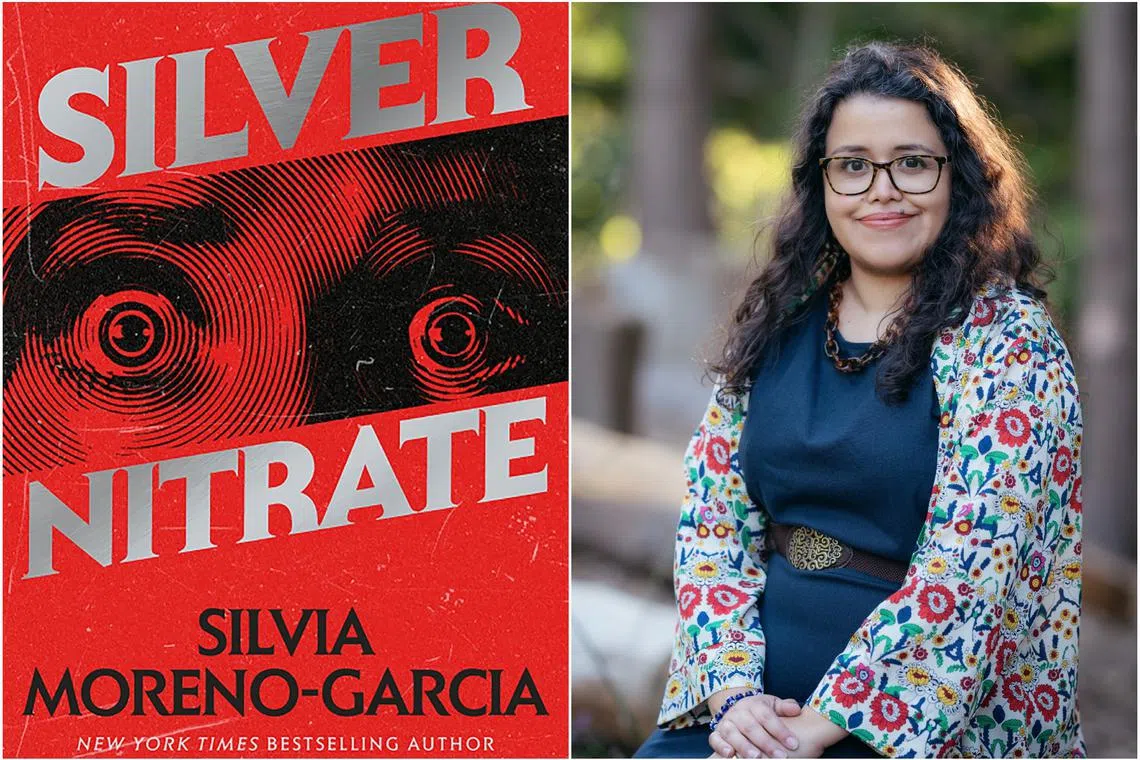Book review: Silvia Moreno-Garcia’s horror novel Silver Nitrate casts a dark spell
Sign up now: Get ST's newsletters delivered to your inbox

Mexican author Silvia Moreno-Garcia's Silver Nitrate is a paean to the golden age of Mexican horror movies.
PHOTOS: PANSING, MARTIN DEE
Silver Nitrate
By Silvia Moreno-Garcia amzn.to/3PEEzn7
Fiction/Jo Fletcher/Hardcover/336 pages/$29.69/Amazon SG (
3 stars
Decades after it was phased out in the 1950s, cinema buffs still wax lyrical about silver nitrate film stock.
Whites “like bleached linen”, blacks “so rich you feel you could bury your hands in that velvet darkness”, raves a character in the novel Silver Nitrate.
Its beauty was unparalleled – and so was its danger.
Nitrate stock was incredibly flammable. Cinemas and film vaults through the decades burned down because the reels got a little too hot.
This valuable, volatile material is at the heart of Mexican author Silvia Moreno-Garcia’s ninth novel, which, though entertaining, ultimately plays it too safe to catch fire.
Moreno-Garcia is at the vanguard of Latin America’s latest horror boom, which she has argued in a New York Times essay is subsuming the magical realism that the region has long been associated with.
Since she shot to the bestseller lists with Mexican Gothic (2020), she has astonished with her prolificacy and genre oscillations, moving from neo-noir thriller Velvet Is The Night (2021) to a revisionist take on 19th-century science fiction in The Daughter Of Doctor Moreau (2022).
Silver Nitrate, set in Mexico City in 1993, is a paean to the golden age of Mexican horror movies and a love letter to a lost era of film-making.
Its chief strength is its no-nonsense narrator Montserrat, 38, a workaholic sound editor who is the only woman at her company besides the receptionist.
She has a deep, abiding love for film, but she is also overworked, overlooked and about to be edged out by a younger male colleague.
Her best friend Tristan, a charming but feckless actor whom she has loved unrequitedly since they were kids, lost his promising career 10 years ago in a car accident that killed his co-star girlfriend.
Now at loose ends, Tristan draws Montserrat into the mystery of his neighbour, the once-legendary cult film director Abel Urueta, who claims to have been cursed by his last film, Beyond The Yellow Door, left unfinished in 1961.
He insists the film was actually a spell by German occultist Wilhelm Ewers, a Nazi supremacist who believed magic was the preserve of an ancient race of Aryan superhumans and their descendants.
But the production was derailed by Ewers’ untimely death and, since then, the cast and crew have suffered misfortune after misfortune.
Urueta enlists Montserrat and Tristan’s help in dubbing a scene from the film, which he believes will complete the spell and lift the curse.
It seems to work at first, and for a while, things go swimmingly for the trio.
But when Tristan is haunted by a ghostly apparition and a dark presence begins following Montserrat, it becomes clear they have unleashed something dangerous.
Film nerds will relish this novel, which is replete with metaphors drawn from sound and video-editing technology.
The film’s curse puts Montserrat in mind of frequency-shifted keying, a way to synchronise electronic instruments – “if you recorded your FSK tone too loudly it would leak onto adjacent tracks”.
Tristan describes Montserrat as a control track dial who, when “adjusted”, helps calibrate the videotape of his life.
This reviewer, for one, finds all this barefaced geekery fascinating, though other readers may see it less as movie magic, more as information overload.
Compared with other recent Latin American horror novels – Argentine author Mariana Enriquez’s terrifying Our Share Of Night (2023), for instance, or even the fungal nightmare of Mexican Gothic – Silver Nitrate’s scares feel rote.
The twists can be spotted from a mile off, as can the inevitable romance.
What it does do well is pay tribute to the underrated talent behind the scenes of every film, who, if they do their jobs right, will go unnoticed by moviegoers.
The next time you hear a scream in a horror flick, spare a thought for the hard-working soul who mixed that sound.
If you like this, read: Siren Queen by Nghi Vo (Tor, 2022, $34.27, Books Kinokuniya, go to str.sg/icEu). In an eldritch version of 1930s Golden Age Hollywood where movies are literally magic, a Chinese-American actress dubbed Luli Wei schemes her way to stardom. Unwilling to play the Asian stereotypes of maids or “fainting flowers”, she finds her niche in monstrosity.
This article contains affiliate links. If you buy through these links, we may earn a small commission.



